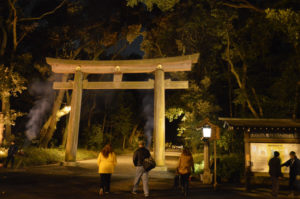The Sun Comes Up Like A God, Silently
January first of 2017. The sun, a half ball of warmth rising toward the tree tops; my windshield is covered with frost and I run back inside to obtain a container of warm water. Can’t drive unless I can see.
Two Baristas behind the counter at Starbucks and just me. The seating area is eerily quiet. Even Starbucks begins the new year with near silence–radical contrast to the usual cacophony.
The Barista across the counter remembers my first name, and the medium-sized-dark-roast coffee that I always order. Surprise and delight, –when anyone remembers my name. Counting my change from the drawer he notices a darkened, worn old penny and remarks that according to the date it was minted in the 1970s. We both realized that was from the last century. We laugh. Would we like to start over from that point in time? Many of us would. Our tone of laughter betrays our felt sadness at the passage of time
Aware of years end, the approach of 2017 I considered what I wanted to say in this first post of the new year. I settled on a well loved poem, by Basho. Here it is:
Year’s end,
all corners
of this floating world, swept.
Oh, to be mind and heart, in accord with this advice. How salutary to receive a reset of hope, of anticipation for what life will bring in the next twelve months, in each day of the next twelve months. The past is over and done with,–there is no help for it. While we live, we have the gift of receiving and of giving back to life. With each new day, each rising sun, and the new year,–creation awaits.
 I felt this most palpably in 1970 standing with a few friends before the Meji Shrine outside of Shinjuku when the clock struck 12AM midnight, as another year began. We stood with thousands around us, all throwing a 10 yen coin into the huge canvas receptacle, and then with folded hands silently praying for good fortune in the year to come. I am not Japanese. I have never since felt more accepted, or more a member of the human family present and past than at that moment. I’ve thought of that experience, every year until now, at New Years time.
I felt this most palpably in 1970 standing with a few friends before the Meji Shrine outside of Shinjuku when the clock struck 12AM midnight, as another year began. We stood with thousands around us, all throwing a 10 yen coin into the huge canvas receptacle, and then with folded hands silently praying for good fortune in the year to come. I am not Japanese. I have never since felt more accepted, or more a member of the human family present and past than at that moment. I’ve thought of that experience, every year until now, at New Years time.
Matsuo Bashō (松尾 芭蕉, 1644–1694), born 松尾 金作, was the most famous poet of the Edo period in Japan. During his lifetime, Bashō was recognized for his works in the collaborative haikai no renga form; today, after centuries of commentary, he is recognized as the greatest master of haiku (then called hokku). Matsuo Bashō’s poetry is internationally renowned; and, in Japan, many of his poems are reproduced on monuments and traditional sites. WIKIPEDIA